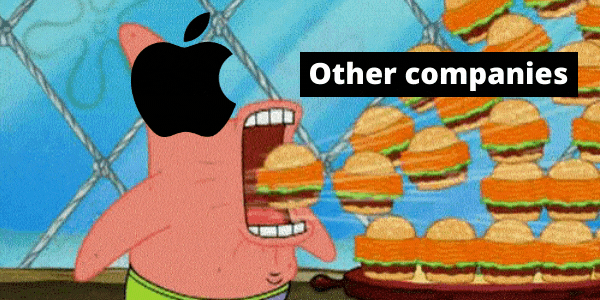Get smarter than your boss in under 3 minutes with today's biz news.
✈️ Webjet plans to be cashflow positive in 2022
🚀 Splitit's merchant sales soar as BNPL goes M&A cray
🎶 Apple quietly buys yet another company - this time a classical music streaming service called Primephonic
Hey hey Flux Fam!
Have you checked out our Flux daily 1 min quiz?! You could win a brand new pair of Airpod Pros - and it's super easy.
Here's everything you need to know today - in under 3 minutes.
✈️ Webjet plans to be cashflow positive in 2022
🚀 Splitit's merchant sales soar as BNPL goes M&A cray
🎶 Apple quietly buys yet another company - this time a classical music streaming service called Primephonic
Nearly 20% of default super products (aka MySuper) have failed the Government's scary new Your Future, Your Super performance test. Now, the super funds behind these products will need to run and tell their members they failed and suggest they switch funds to get a better outcome. FYI Flux Fam, around 1.1 million of us are in those underperforming funds. Yikes.

Background: Webjet is the Aussie travel platform where you can book from different airlines all in the one spot. It's got a market cap of a huge $2 billion, but with COVID obliterating the entire travel industry, Webjet took a pretty big hit.
What happened: For the 2020 financial year, Webjet posted a $143 million. And for the nine months to March 2021, they lost a further $156 million. All in all, Webjet copped a bigger beating than Scott Disick's ego after seeing Kourtney and Travis Barker together.
What else: Now, Webjet reckons it will be cashflow positive in 2022, thanks to its new post-COVID strategy which involves its WebBeds biz. FYI, WebBeds is like the middle-man between hotels and travel agents, and it's been hugely profitable for the company. And, it'll only get better once Australia begins opening up borders.
💡 A company makes money from their products or services (cash coming in) and loses money on expenses (cash going out). This is called cashflow.
💡 Being cashflow positive means a company's cash on hand is increasing, which means it has more flexibility to do things like cover expenses, reinvest into the biz and return money to shareholders.
💡 Positive cashflow is a good sign that a company has some seriously strong financial management. And, it shows the company has long-term viability. And after a shocker year for Webjet, shareholders could use some good news.

Background: Splitit is yet another buy now, pay later (BNPL) platform that, surprise surprise, lets you pay in instalments. But it's a lil different to the BNPLs we're used to. Unlike Zip, Splitit lets you use your existing credit card to pay. And, unlike Afterpay, Splitit lends you the full purchase amount at the checkout.
What happened: It's worth around $280 million, and they've been growing pretty rapidly. In fact, they've just partnered with Tabby - the leading BNPL in the Middle East - which supports more than 2,000 big-name merchants like Ikea, SHEIN and Adidas.
What else: Splitit's merchant sales volumes climbed 94% to a huge $236 million, and gross revenue was up 80% to $7.5 million. And it's come at a time when the BNPL sector is seeing a tonne of mergers and acquisitions.
💡 Each industry has its own lifecycle. It starts with the 'introduction' phase, where competitors start to pop up everywhere to take advantage of hot demand. BNPL was there, but now it's starting to enter its next phase.
💡 This is the part where businesses start to consolidate to produce the strongest players - aka survival of the fittest. We saw:
💡 Some day, we'll hit decline. Like where credit cards are right now. But for now, because we're seeing consolidation in the industry, this could be a sign that the BNPL industry lifecycle is maturing.

Background: We know that you know what Apple is Flux fam. But it pays to take a quick trip down memory lane. Apple is worth a massive US$2 trillion, and it's responsible for pretty much every major tech development since the 2000s.
What happened: Remember iTunes? Yeah, me neither. Apple exchanged U2s entire album for a new subscription service called Apple Music, which now has over 660 million subscribers (compared to Spotify's 158 million paid subscribers).
What else: And now it can add a classical music streaming service, Primephonic, to its toolkit. Apple quietly bought Primephonic with plans to turn into its own classic music-focused app next year. It's just another company they've bought on the DL as part of its 'aqcui-hire' strategy.
💡 An acqui-hire is a strategic purchase of a small company. Not for the brand...not for the product...but for the staff. And Apple loves to do this.
💡 In the last six years, Apple's bought 100 companies, which works out to around one company every three to four weeks across a heap of industries, like augmented and virtual reality, AI, maps, health and even semiconductors.
💡 Companies use acqui-hires to help them speed up expansion - particularly in areas where the company doesn't have the technical talent. Like when Apple acquired AuthenTec in 2012 - which eventually led to the iPhone's fingerprint scanner. Long live the acquihire.
Sign up for Flux and join 100,000 members of the Flux family